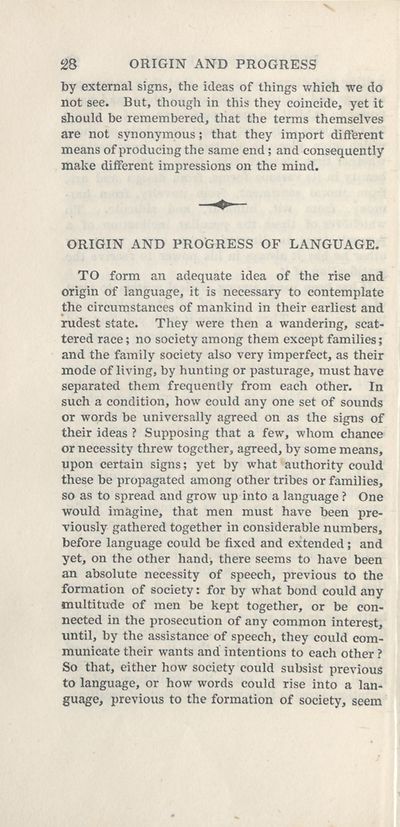Education > Essays on rhetoric
(56)
Download files
Complete book:
Individual page:
Thumbnail gallery: Grid view | List view

28 ORIGIN AND PROGRESS
by external signs, the ideas of things which we do
not see. But, though in this they coincide, yet it
should be remembered, that the terms themselves
are not synonymous; that they import different
means of producing the same end ; and consequently
make different impressions on the mind.
ORIGIN AND PROGRESS OF LANGUAGE.
TO form an adequate idea of the rise and
origin of language, it is necessary to contemplate
the circumstances of mankind in their earliest and
rudest state. They were then a wandering, scat¬
tered race; no society among them except families;
and the family society also very imperfect, as their
mode of living, by hunting or pasturage, must have
separated them frequently from each other. In
such a condition, how could any one set of sounds
or words be universally agreed on as the signs of
their ideas ? Supposing that a few, whom chance
or necessity threw together, agreed, by some means,
upon certain signs; yet by what authority could
these be propagated among other tribes or families,
so as to spread and grow up into a language ? One
would imagine, that men must have been pre¬
viously gathered together in considerable numbers,
before language could be fixed and extended; and
yet, on the other hand, there seems to have been
an absolute necessity of speech, previous to the
formation of society: for by what bond could any
multitude of men be kept together, or be con¬
nected in the prosecution of any common interest,
until, by the assistance of speech, they could com¬
municate their wants and intentions to each other ?
So that, either how society could subsist previous
to language, or how words could rise into a lan¬
guage, previous to the formation of society, seem
by external signs, the ideas of things which we do
not see. But, though in this they coincide, yet it
should be remembered, that the terms themselves
are not synonymous; that they import different
means of producing the same end ; and consequently
make different impressions on the mind.
ORIGIN AND PROGRESS OF LANGUAGE.
TO form an adequate idea of the rise and
origin of language, it is necessary to contemplate
the circumstances of mankind in their earliest and
rudest state. They were then a wandering, scat¬
tered race; no society among them except families;
and the family society also very imperfect, as their
mode of living, by hunting or pasturage, must have
separated them frequently from each other. In
such a condition, how could any one set of sounds
or words be universally agreed on as the signs of
their ideas ? Supposing that a few, whom chance
or necessity threw together, agreed, by some means,
upon certain signs; yet by what authority could
these be propagated among other tribes or families,
so as to spread and grow up into a language ? One
would imagine, that men must have been pre¬
viously gathered together in considerable numbers,
before language could be fixed and extended; and
yet, on the other hand, there seems to have been
an absolute necessity of speech, previous to the
formation of society: for by what bond could any
multitude of men be kept together, or be con¬
nected in the prosecution of any common interest,
until, by the assistance of speech, they could com¬
municate their wants and intentions to each other ?
So that, either how society could subsist previous
to language, or how words could rise into a lan¬
guage, previous to the formation of society, seem
Set display mode to:
![]() Universal Viewer |
Universal Viewer | ![]() Mirador |
Large image | Transcription
Mirador |
Large image | Transcription
| Antiquarian books of Scotland > Education > Essays on rhetoric > (56) |
|---|
| Permanent URL | https://digital.nls.uk/113760164 |
|---|
| Description | Thousands of printed books from the Antiquarian Books of Scotland collection which dates from 1641 to the 1980s. The collection consists of 14,800 books which were published in Scotland or have a Scottish connection, e.g. through the author, printer or owner. Subjects covered include sport, education, diseases, adventure, occupations, Jacobites, politics and religion. Among the 29 languages represented are English, Gaelic, Italian, French, Russian and Swedish. |
|---|

